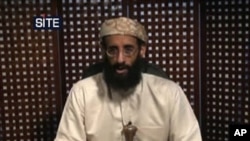Few places have seen Osama bin Laden's ideology take root as strongly as Yemen, the impoverished Arab nation that is the late al-Qaida leader's ancestral home.
Al-Qaida in the Arabian Peninsula is one of the most active groups inspired by bin Laden. In recent years, it has been implicated in plots to bring down a U.S. airliner, send bombs via cargo planes, attack embassies and kill foreign nationals.
There are direct links to the main al-Qaida group, which claimed responsibility for the bombing of the American ship, USS Cole, in Yemen in 2000.
And according to Yemeni writer and political analyst Nasser Arrabyee, the local franchise may have even overtaken its predecessor.
"They have the same thought, the same goals, the same methods. And maybe Al-Qaida in the Arabian Peninsula is even more dangerous because of the Yemeni-American leader now - Anwar al Awlaki."
No shortage of fresh blood
The American-born Awlaki is seen as the face of a new generation of terrorists. The articulate English-speaker, considered an operational mastermind by the United States, is an Internet sensation, with his blog, YouTube videos and Facebook page attracting a loyal following worldwide.
That ease with social media was seen among other Yemeni extremists, who created Facebook pages honoring bin Laden just hours after his death was announced. For a while bin Laden had little to do with the local group, but he remains a powerful symbol.
Some in Yemen consider bin Laden a liberator, who lived and died a hero. The that the al-Qaida leader is also thought as someone who stood against the unjust.
Lack of instability compounds problem
Right now, the unjust for al-Qaida supporters is the Yemeni government. And this is where, like many things in Yemen, the situation gets complicated.
The anti-government demonstrations that have roiled the country for months are for the most part a call for democracy and greater freedom. But they also offer al-Qaida an opening in a fragile state torn by tribal allegiances, a rebellion in the north and a secessionist movement in the south. Political analyst Arrabiyee says extremists are only waiting for the right moment.
"Al-Qaida can only make a big victory when Yemen collapses into chaos and this is what al Qaida is waiting [for] now. Al-Qaida has reduced a lot of its operations in order not to help President Saleh politically. So they are waiting for chaos, for a collapse in Yemen to grow more and more and to recruit more and more."
Western countries face dilemma
That puts Western countries, especially the United States, in a bind, as they try to balance popular demands against the Yemeni government's stated commitment to anti-terrorism.
Washington has made President Ali Abdullah Saleh a partner in fighting al-Qaida, and supports his government with military and financial aid. Saleh's detractors claim he overstates the terror threat - and his role in fighting it - to keep the backing of his foreign allies. Najeeb Ghanem is a member of the opposition in Yemen's parliament.
"We think that al-Qaida threat might be implemented by the Saleh regime to make some sort of intimidation of others, and using this for abusing of the heads of opposition and a lot of forces in Yemen."
Only “one way out,” some believe
Ghanem believes the best way out is to take the risk of political change.
"We think that the stabilizing system which is going to be alive after the success of the revolution will be able to deal with this challenge in Yemen. So we do not think we are going to face that dangerous threat by al-Qaida."
Ghanem is a rare optimist in a country facing threats from so many sides.
Bin Laden's Legacy Strong in Yemen




